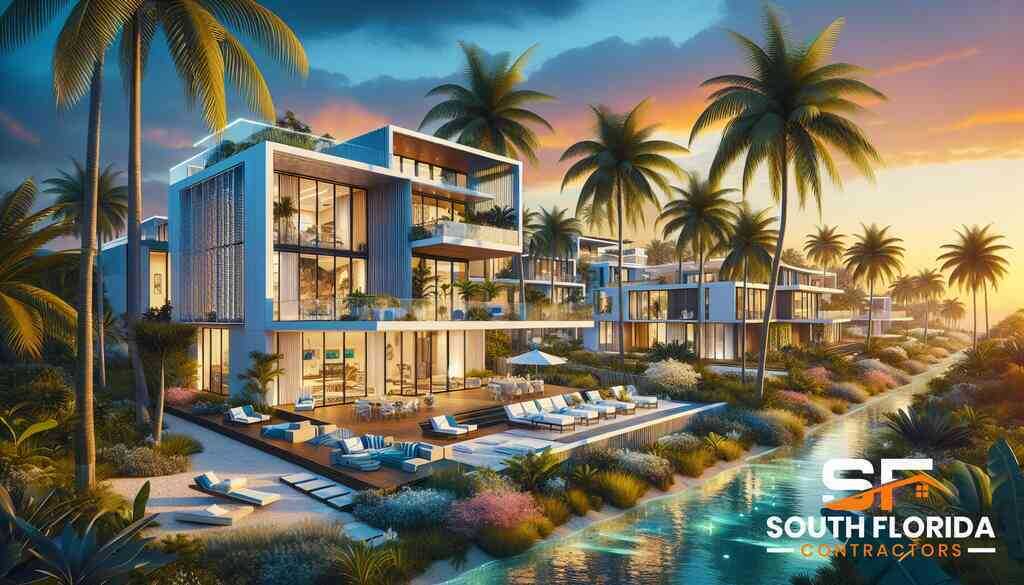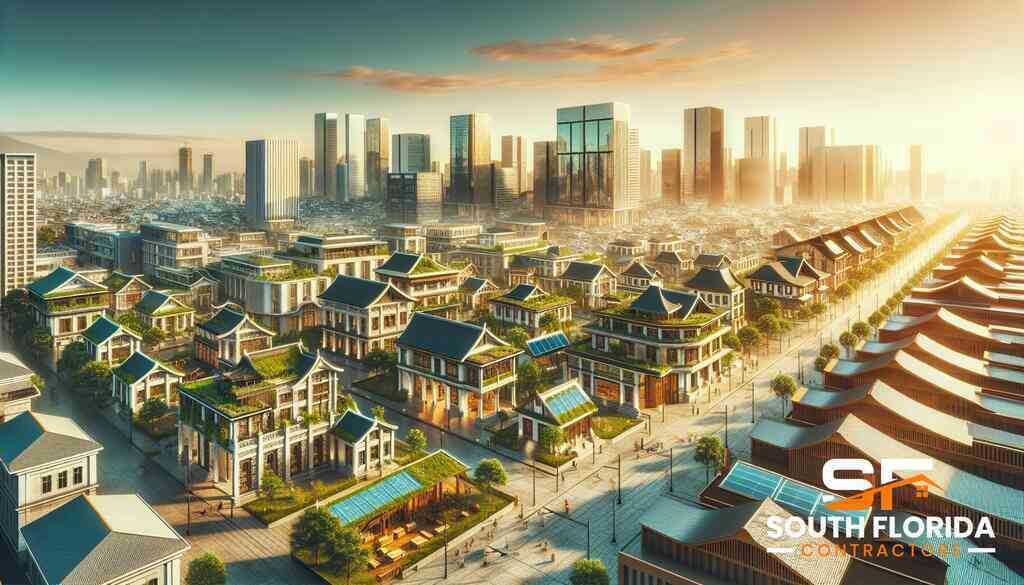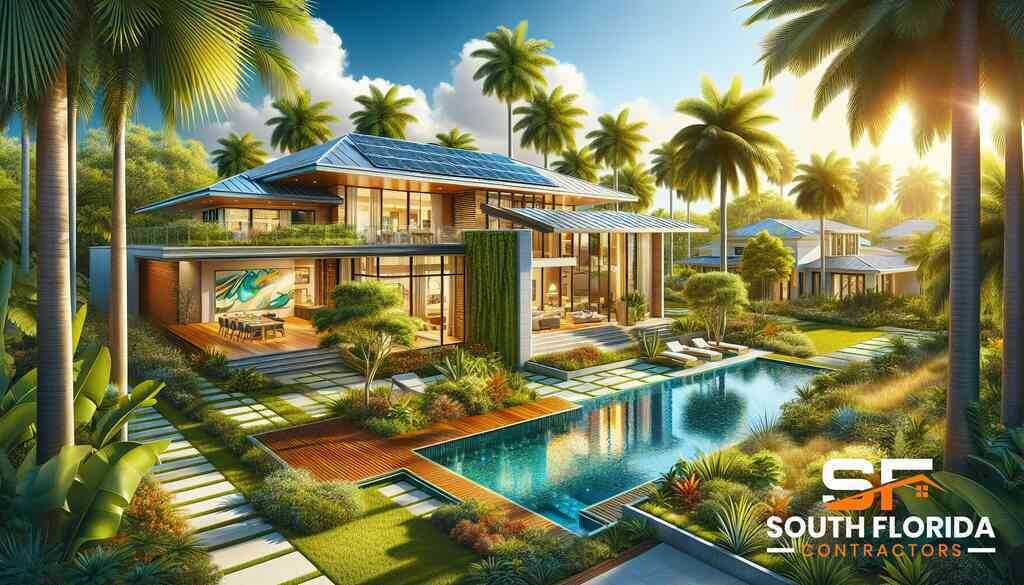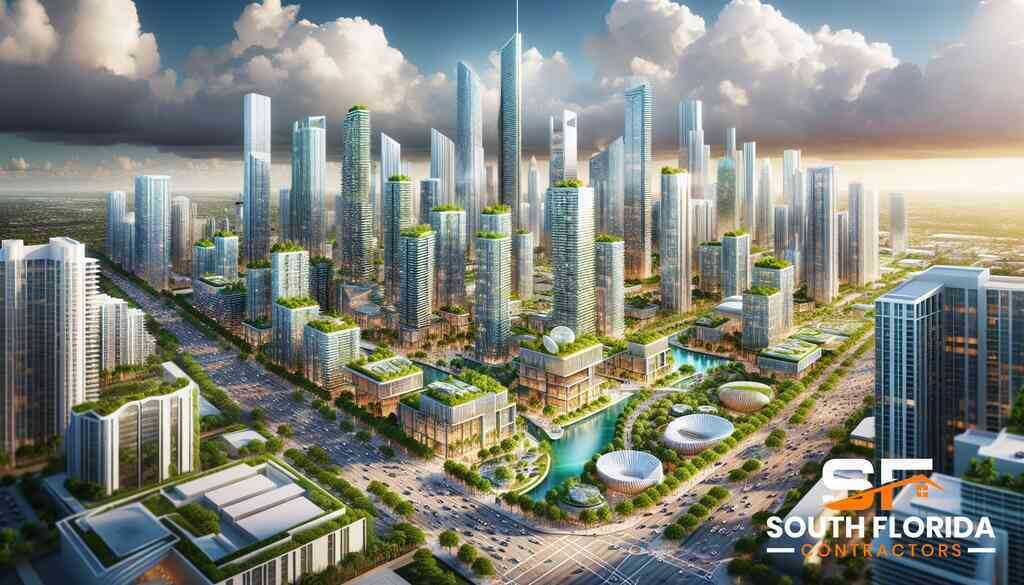
Top 10 Innovative Construction Strategies in 2024
November 15, 2024
Pioneering the Future: An Introduction to Construction Innovations
The Changing Landscape of Construction in 2024
In 2024, the construction industry faces a transformative landscape driven by exponential technological advancements and sustainability imperatives. This evolution promises to redefine project execution, emphasizing efficiency, eco-friendly designs, and innovative construction methods in South Florida. As contractors grapple with these changes, they are compelled to adopt practices like innovative construction technology developments, which offer pathways to more integrated and streamlined building processes. Mind-boggling innovations, such as AI-driven project management and Internet of Things (IoT) applications, are increasingly becoming standard, propelling the sector toward a future-oriented approach.
Why Innovation is Key for South Florida Contractors
For South Florida contractors, embracing innovation is essential in maintaining competitive advantage and meeting client needs in an ever-evolving market. The unique environmental and architectural demands of the region require solutions that are both creative and practical, such as integrating sustainable building techniques near you. These approaches are not merely industry trends but necessities driven by heightened consumer awareness and regulatory demands for sustainable practices. Contractors must leverage cutting-edge tools and methodologies to deliver projects that are not only aesthetically pleasing but also resilient and efficient, addressing the pressing concerns of climate change and urban development.
Overview of Emerging Technologies and Trends
Emerging technologies are reshaping the contours of construction, paving the way for more sophisticated and efficient building practices. Key trends include the burgeoning use of construction automation using robotics, which significantly enhances precision and reduces labor costs. Energy-efficient construction in South Florida is also gaining traction, with builders incorporating materials and techniques designed to minimize energy consumption and maximize resource efficiency. Another pivotal trend is the integration of digital tools, such as augmented reality and virtual reality, which enhances project visualization and stakeholder engagement. Collectively, these advancements herald a new era of construction that is more dynamic, responsive, and aligned with the demands of modern society.
1) Sustainable Building Techniques: Green is the New Standard
Integrating Eco-Friendly Construction Materials
In 2024, the construction industry is increasingly leaning towards sustainable building techniques. These methods are pivotal for reducing environmental impact and promoting ecological balance. South Florida contractors are at the forefront, actively adopting eco-friendly construction materials that not only lower carbon footprints but also bolster building durability. South Florida Contractors’ Ultimate Guide to Eco-Friendly Materials For instance, recycled steel, bamboo, and hempcrete are gaining popularity for their sustainable properties and excellent performance metrics. Embracing these materials is vital for crafting structures that are both innovative and responsible, aligning with the demands of environmentally conscious clients and stringent regulations.
The demand for sustainable building techniques near you is rising as communities understand the importance of using materials that respect natural resources. The integration of these materials into construction projects signifies a shift towards greener and more sustainable urban environments. This move aligns with the industry’s pledge to innovate while addressing climate change, ensuring that today’s buildings do not compromise tomorrow’s ecosystem.
LEED-Certified Construction Projects in South Florida
LEED (Leadership in Energy and Environmental Design) certification continues to be a gold standard in sustainable construction. In South Florida, contractors are increasingly involved in LEED-certified projects, which serve as benchmarks for environmental responsibility. Understanding Sustainable Building Techniques in Florida These projects emphasize energy efficiency, water conservation, and improved indoor environmental quality, thus paving the way for healthier and more sustainable living spaces.
Achieving LEED certification is not just a trend but a commitment to excellence and sustainability. It enhances a project’s value while reinforcing a company’s reputation as a leader in green building practices. This approach also yields financial benefits through energy savings and increased property values, making it a strategic choice for any South Florida contractor committed to the future of sustainable development.
Sustainable Urban Planning and Its Impact
Sustainable urban planning is fundamentally transforming South Florida’s construction landscape. This approach focuses on creating livable, resilient communities with efficient energy use, reduced carbon emissions, and effective resource management. By investing in sustainable urban planning, South Florida contractors not only contribute to the well-being of future generations but also enhance the quality of life for current residents.
The impact of sustainable urban planning extends beyond environmental considerations; it also influences economic and social dimensions. By fostering mixed-use developments, promoting walkability, and enhancing public transportation options, contractors play a crucial role in shaping vibrant, interconnected communities. This comprehensive planning is essential for meeting the challenges of rapid urbanization and climate change, ensuring South Florida remains a desirable place to live, work, and thrive.
South Florida contractors are uniquely positioned to lead in this area. Urban planning innovations enable them to implement sustainably conscious solutions that cater to the region’s distinct environmental and social needs.
2) Smart Construction Technology: The Digital Revolution
Implementing AI in Construction Processes
The integration of Artificial Intelligence (AI) into construction processes is revolutionizing how projects are designed, managed, and executed. Ultimate Guide to Integrating AI in Construction by South Florida AI tools are allowing South Florida contractors to predict project timelines more accurately, streamline workflows, and enhance safety measures. By harnessing the power of AI, construction companies can anticipate potential issues and address them proactively, minimizing delays and overruns. These advancements not only boost productivity but also align with industry goals for sustainable and efficient operations, making them indispensable in modern construction practices.
Moreover, AI-driven project management tools are increasingly popular among South Florida general contractors, enabling real-time data analysis and decision-making. This technology aids in resource allocation and optimizes labor and materials, which supports more environmentally conscious construction practices. As these tools continue to evolve, they promise to become even more integral to the construction industry’s digital transformation, enhancing efficiency and competitiveness in the market.
The Role of Construction Data Analytics
Construction data analytics is becoming a critical component for South Florida construction companies striving for excellence in project execution. By utilizing analytics platforms, contractors can dissect vast amounts of data generated during building processes, uncovering insights that drive optimization and innovation. This practice empowers companies to make informed decisions, improve operational efficiency, and predict future trends, setting new benchmarks in construction quality and performance.
In South Florida, contractors who embrace construction data analytics gain a significant edge, as these tools reveal opportunities for cost reduction and performance improvement. For instance, analytics can highlight inefficiencies in workflow or predict equipment maintenance needs, preventing costly downtime. As data analytics continues to evolve, its application in the construction industry will undoubtedly expand, leading to more intelligent, more resilient buildings.
IoT Solutions for Smarter Building Management
The Internet of Things (IoT) is transforming building management by introducing intelligent solutions that elevate the functionality and efficiency of constructed spaces. In South Florida, IoT applications are being integrated to enhance building performance and improve occupant experiences through intelligent systems that manage lighting, climate, and security automatically.
IoT solutions enable real-time monitoring and control of building systems, providing valuable insights that lead to optimized resource use and decreased operational costs. For example, sensors can adjust energy use based on occupancy, promoting energy-efficient construction practices and reducing overall carbon footprints. As this technology matures, the opportunities for South Florida contractors to create innovative and sustainable building solutions will expand, underscoring the importance of smart home integration practices in modern construction strategies across the region.
3) Prefabricated Construction Methods: Efficiency Redefined
Understanding Prefabrication and Its Benefits
Prefabrication is revolutionizing the construction industry with its emphasis on efficiency, cost reduction, and sustainability. This method involves assembling building components off-site, which are then transported and installed at the construction location. The benefits of prefabrication are manifold, including reduced construction time, minimized waste, and enhanced quality control. South Florida contractors are adopting these techniques to deliver projects swiftly and sustainably while also minimizing on-site disruptions. Prefabrication allows for a more streamlined construction process, making it an attractive option for those looking to capitalize on innovative construction methods in South Florida.
The use of prefabricated construction methods leads to significant cost savings by reducing labor expenses and shortening project timelines. Moreover, it provides an opportunity for greater customization and precision, as components are manufactured in controlled environments. As demand for efficient building processes grows, South Florida general contractors are expected to integrate prefabrication more extensively, meeting the region’s diverse construction needs with unprecedented speed and accuracy. This approach not only benefits contractors but also significantly enhances client satisfaction by delivering high-quality, durable structures.
Prefabricated vs. Traditional Construction: A Comparative Analysis
When comparing prefabricated construction with traditional methods, several key differences emerge. Prefabrication offers enhanced speed, as building components are manufactured concurrently with site preparation, often resulting in faster project completion. In contrast, traditional construction typically involves sequential phases that can be delayed due to weather or logistical issues. The prefabricated vs. traditional construction debate often highlights prefabrication’s edge in consistency and quality owing to its controlled manufacturing environments.
However, traditional construction retains its advantages in flexibility and adaptability, particularly for intricate designs and unique site challenges. Prefabrication, while precise, might require additional planning and upfront investments in design and logistics. Yet, as technology advances, these barriers diminish, enhancing prefabrication’s appeal. South Florida contractors are well-positioned to balance these approaches, leveraging the strengths of both to optimize project outcomes and meet the unique architectural demands of the region.
Case Studies from South Florida
South Florida has witnessed impressive deployments of prefabricated construction, showcasing its potential to redefine building practices. The Difference Between Modular and Custom Homes For instance, several residential developments in Boca Raton construction projects have utilized prefabricated modules to expedite completion while maintaining high aesthetic and structural standards. This method has proven especially effective in areas with stringent timelines and complex logistical considerations, demonstrating prefabrication’s versatility and scalability.
Another notable example is in the commercial sector, where prefabricated techniques have facilitated the rapid construction of office spaces with minimal environmental impact. Projects in Boynton Beach have embraced this approach, reflecting a growing trend toward sustainable building practices and innovative construction solutions. Exploring Sustainable Construction Methods Near You By examining these case studies, South Florida contractors can glean valuable insights into the practical applications and benefits of prefabrication, positioning them to harness this method’s full potential in future projects.
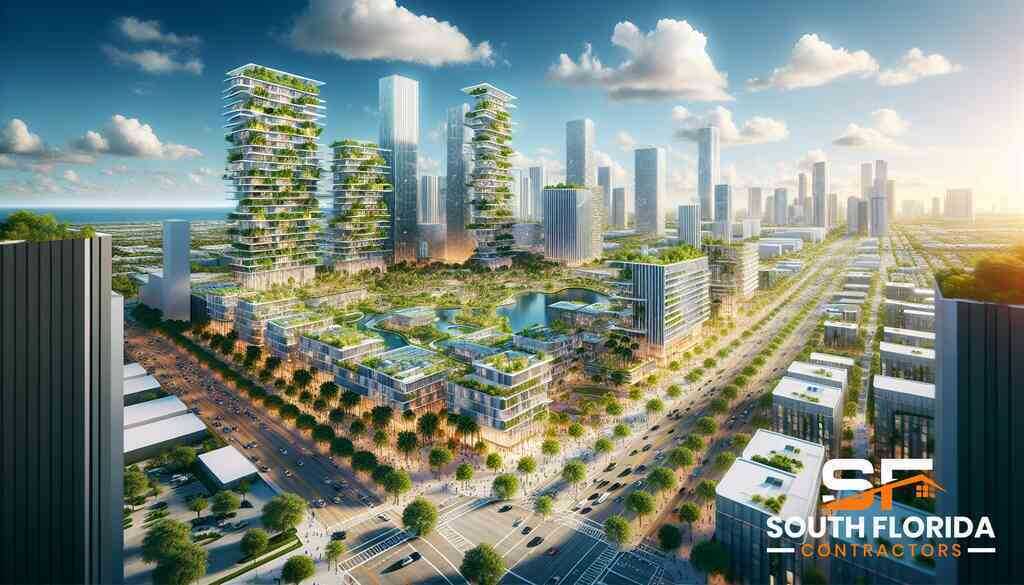
4) Modular Building Innovation: Flexibility and Functionality
Exploring Modular Building Designs
Modular building designs offer revolutionary flexibility and functionality in the construction industry, redefining how spaces are conceptualized and executed. These designs leverage modular technology to assemble pre-fabricated units, offering a versatile approach to residential and commercial projects. South Florida general contractors are increasingly exploring modular building innovation examples, demonstrating the method’s efficiency and adaptability. By leveraging modular systems, contractors can focus on customizing designs to meet specific client needs while significantly reducing construction timelines.
The appeal of modular building innovations in South Florida is not solely about speed; it’s about the potential for unique architectural designs. This flexibility allows for varied applications, ranging from small-scale home additions to large, complex structures. As a result, clients enjoy a seamless blend of innovation and traditional aesthetics, providing them with high-quality building options tailored to their unique needs.
Modular Construction in Urban versus Rural Areas
The application of modular construction varies markedly between urban and rural settings, each presenting distinct challenges and opportunities. In urban areas, modular building methods can overcome constraints of space and labor shortages. South Florida contractors have found that modular solutions minimize disruptions in bustling environments, making them ideal for high-density residential and commercial projects. By utilizing modular techniques, builders can efficiently manage tight construction schedules while maintaining high quality, a crucial aspect of urban projects where time and space are at a premium.
Conversely, in rural areas, modular construction offers significant advantages in terms of logistics and resource management. The nature of prefabricated modules constructed off-site and then transported allows for streamlined project execution even in remote areas with limited access to traditional building resources. This capability is particularly beneficial in Florida’s diverse landscapes, where rural development often demands innovative approaches to construction.
Success Stories of Modular Projects in South Florida
South Florida has experienced impressive success stories that highlight the transformative potential of modular construction techniques. For instance, the adoption of modular systems in Boynton Beach renovations has led to enhanced efficiency and project delivery times, reinforcing the method’s applicability in various settings. These projects capitalize on modular architecture’s ability to reduce waste and increase precision, offering a sustainable and cost-effective solution for modern construction demands.
In the commercial sector, South Florida contractors have implemented modular strategies in urban hubs, such as Miami, where the need for rapid yet resilient development is paramount. These projects demonstrate how modular building innovations can harmonize with existing urban environments, enhancing architectural aesthetics while promoting sustainability. These examples underscore the flexibility and novelty of modular designs within South Florida’s vibrant construction industry, making them exemplary models for future development initiatives.
5) Energy-Efficient Construction Practices: Powering the Future
Techniques for Maximizing Energy Efficiency
Energy efficiency has become a cornerstone of modern construction practices, particularly in South Florida, where the climate demands thoughtful design. Techniques focusing on maximizing energy efficiency include strategically orienting buildings to leverage natural light and ventilation. Incorporating advanced insulation materials and energy-efficient windows plays a critical role in reducing unnecessary energy consumption. These elements, coupled with intelligent energy management systems, enable better resource utilization and lower operational costs.
Moreover, South Florida contractors are implementing passive solar design principles, which optimize the use of solar gains to regulate building temperature without relying heavily on artificial heating or cooling. By integrating photovoltaic panels, these constructions can further decrease energy dependency, aligning with the region’s commitment to eco-friendliness. Such techniques empower construction services to deliver high-performing, energy-efficient structures that meet both regulatory and consumer expectations.
Emerging Energy-Efficient Materials
The advent of emerging energy-efficient materials is revolutionizing the construction landscape. These materials, ranging from advanced aerogels to phase-change materials, offer superior thermal performance, significantly cutting down on energy consumption. Materials that incorporate nanotechnology are auspicious, improving insulation and strength while remaining cost-effective.
South Florida construction companies are pioneering the use of “cool roofs” and reflective paints that minimize heat absorption, reducing the load on cooling systems. Additionally, high-efficiency lighting systems such as LEDs contribute to energy reductions while enhancing indoor environments. These materials are not only transforming construction methodologies but also paving the way for more sustainable building solutions. As the demand for energy-efficient homes increases, South Florida general contractors are at the forefront, leveraging these innovative materials to provide solutions that align with modern ecological standards.
Achieving Energy Star Certifications
Achieving Energy Star certifications is a significant milestone for construction companies aiming to demonstrate their commitment to energy efficiency. This certification, awarded to buildings that significantly conserve energy, requires adherence to stringent guidelines throughout the construction process. Contractors in South Florida are increasingly pursuing these certifications to enhance their project offerings and appeal to environmentally-conscious clients.
To secure Energy Star certification, builders need to focus on comprehensive energy assessments, ensuring that the building’s design, materials, and mechanical systems meet the required efficiency standards. This process involves a detailed analysis and often the integration of energy-efficient appliances and systems. Energy-efficient construction in South Florida aims to reflect these principles, promoting designs that not only reduce energy usage but also offer financial benefits to occupants through reduced utility bills. The pursuit of Energy Star certifications thus represents a commitment to building eco-friendly, high-performance structures that serve the community and the planet.
6) Construction Automation: Robots at Work
Introduction to Construction Robotics
Construction robotics will be at the forefront of innovative construction strategies in 2024, offering transformative potential in how projects are executed. These robots are designed to handle repetitive and labor-intensive tasks such as bricklaying, 3D printing, and even tedious inspections. By integrating cutting-edge construction automation using robotics, South Florida contractors are not only enhancing efficiency but also reducing the scope for human error. Robotics in construction provides consistent quality and speed, characteristics that are invaluable in meeting tight project deadlines.
The deployment of robots in construction sites of South Florida general contractors is signaling a shift toward more automated building processes. Robotic solutions are evolving rapidly, offering adaptive and safe operational capacities that match the dynamic demands of modern construction projects. As the industry continues to innovate, these robots are expected to take on more complex tasks, paving the way for transformative changes in the construction landscape.
Automation Driving Efficiency Gains
The adoption of automation technologies is revolutionizing traditional construction practices by significantly enhancing project efficiency. Automation in construction operations allows for greater precision and faster task execution, leading to reduced timelines and cost-saving benefits. South Florida contractors are increasingly leveraging automated machinery to deliver projects more efficiently, attracting more businesses seeking reliable construction services.
Automated solutions reduce material waste, optimize equipment usage, and enable better scheduling and resource allocation. This aspect is crucial for sustainable urban planning, aligning project delivery with sustainability goals. By embracing automation, construction companies in South Florida are not only ensuring productivity gains but also contributing to eco-friendly practices, responding to the growing demand for green building techniques.
Impact on Labor and Employment
The integration of automation and robotics in construction has profound implications for labor and employment within the industry. While some fear the displacement of workers, the rise of automation is also creating new opportunities. Skilled labor is still essential for operating and maintaining these advanced machines, underscoring the necessity for workforce upskilling. South Florida contractors are investing in training their teams to harness the potential of these technologies effectively.
Moreover, automation is allowing human workers to focus on more complex tasks rather than routine, monotonous jobs. This shift can lead to improved job satisfaction and safety on construction sites as machines take on hazardous duties. As South Florida continues to evolve as a hub for Boynton Beach renovations, the marriage of intelligent technology and skilled labor promises to redefine construction work, emphasizing the region’s commitment to progressive growth.
7) Modern Architecture Designs: A New Aesthetic
Exploring Modern Architectural Trends
In 2024, modern architectural trends are pushing the boundaries of conventional design, reflecting a fusion of form and function. Ultimate Guide to High-End Construction Trends 2024 These trends emphasize minimalism, sustainable materials, and sleek lines that redefine aesthetic standards. The influence of technology is prominent, with advancements like parametric design offering architects new ways to conceptualize spaces that are both innovative and green. South Florida contractors lead in adopting modern architectural designs in Florida, creating homes and buildings that blend seamlessly with the landscape while setting new benchmarks for elegance and functionality.
Another defining characteristic is the use of natural materials, which focuses on creating harmonious environments that connect with nature while integrating smart city innovations. These aspects align with the growing demand for eco-friendly construction that doesn’t sacrifice comfort or beauty. As these trends continue to evolve, they highlight the industry’s commitment to crafting spaces that respect ecological constraints while offering aesthetic excellence.
Influences of Contemporary Design in Construction
Contemporary design in construction is influenced by many factors, including technological advancements, environmental considerations, and changing consumer preferences. In South Florida, contemporary designs are marked by an emphasis on sustainability and energy efficiency. The integration of elements like large windows and open-plan layouts enhances natural light use, reducing energy needs and creating inviting spaces.
Incorporating innovative technologies further enhances these designs by enabling better resource management and increased occupant comfort. Contractors focusing on these innovative construction methods in South Florida can offer significant value by blending aesthetics with practicality. The contemporary design thus emerges as a holistic approach that caters to modern living requirements, setting the stage for future-forward building strategies that are both attractive and responsible.
Iconic Modern Buildings in South Florida
South Florida boasts numerous iconic modern buildings that epitomize the fusion of cutting-edge design and functionality. These structures stand as testaments to innovative architectural practices that prioritize sustainability, aesthetics, and community integration. Among these, high-rise residential towers and commercial complexes in Miami showcase trendsetting designs characterized by their fluid forms and eco-sensitive features, such as green roofs and energy-efficient facades.
Projects in the region, embracing Palm Beach County sustainable homes, demonstrate an innovative blend of style and function, embodying principles that serve as inspiration for subsequent developments. These architectural marvels not only become landmarks but also influence future construction endeavors, showcasing South Florida’s role as a leader in modern architecture. Through their design solutions, contractors in this region continue to shape an urban landscape that is both progressive and quintessentially Floridian.
8) Advanced Construction Management: Leadership in Building
Adopting Agile Project Management Techniques
Agile project management strategies have become indispensable in the fast-paced world of construction, where adaptability and efficiency are paramount. For South Florida contractors, adopting these methodologies means embracing iterative planning and execution processes that respond swiftly to changing project needs. Agile principles prioritize collaboration and flexibility, enabling teams to deliver high-quality outcomes under challenging deadlines and fluctuating circumstances. This approach aligns seamlessly with the construction sector’s demand for swift responses to client feedback and evolving design requirements.
In South Florida, where construction projects often contend with unpredictable weather and environmental considerations, agile methodologies can be particularly advantageous. By fostering open communication and continuous improvement, contractors can optimize resource allocation and mitigate risks effectively. Embracing these techniques not only enhances contractor project management skills but also ensures that efforts are aligned with broader industry trends toward efficiency and innovation.
The Role of Digital Tools in Management
Digital tools are revolutionizing construction management, offering unprecedented levels of efficiency and accuracy. These tools, ranging from Building Information Modeling (BIM) to cloud-based collaboration platforms, enable real-time communication and data access across project teams in South Florida. By doing so, they ensure that all stakeholders have consistent access to vital project details, reducing the likelihood of costly errors or miscommunications.
The use of digital tools transcends traditional boundaries, allowing South Florida construction companies to perform comprehensive analyses and simulations, identifying optimal design and construction strategies before breaking ground. This digital transformation aligns with the growing demand for sustainable and efficient construction practices, ensuring that projects are both economically feasible and environmentally responsible. As these tools evolve, their role in managing construction projects will continue to expand, offering further potential for enhanced productivity and innovation.
Managing Large Scale Projects Efficiently
Managing large-scale construction projects efficiently requires a comprehensive understanding of logistics, resources, and timelines. For South Florida general contractors, strategic planning and advanced management techniques are crucial for ensuring successful project delivery in the region’s dynamic environment. By adopting integrated management systems, contractors can streamline operations, optimize resource use, and track project progress meticulously.
Given the complexity of large projects, leveraging advanced technologies like AI-driven analytics and IoT for real-time monitoring can offer significant operational advantages. These tools enable contractors to anticipate challenges and adjust strategies proactively, minimizing disruptions and ensuring projects remain on schedule and within budget. Moreover, understanding the synergy of modular building innovation examples facilitates the efficient handling of large and complex projects by simplifying assembly processes and reducing on-site work. Such strategic management practices are essential for meeting client expectations and maintaining a competitive edge in South Florida’s thriving construction market.
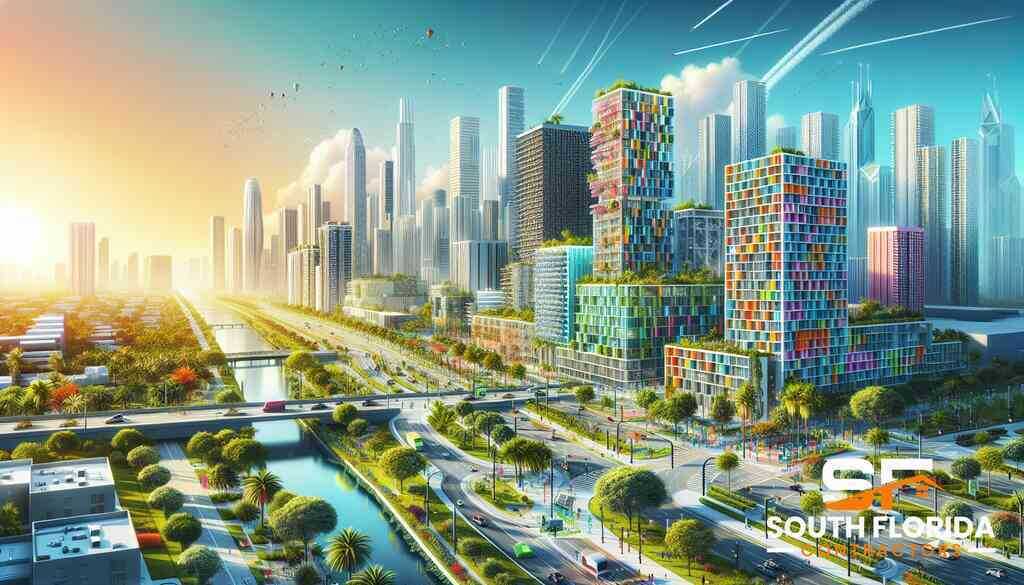
9) 3D Printing in Construction: Building Layer by Layer
How 3D Printing is Revolutionizing Construction
3D printing represents a paradigm shift in construction, offering unprecedented capabilities in creating complex structures with fewer resources and less time. This technology uses digital models to produce physical objects layer by layer, thereby minimizing waste and optimizing material use. In South Florida, the adoption of 3D printing innovations in the building is streamlining the construction process, allowing for intricate designs that traditional methods struggle to replicate with the same precision and speed. The customization potential is immense, enabling builders to tailor projects specifically to clients’ needs and local architectural styles.
This technology also reduces the environmental impact of construction by utilizing sustainable materials and recycling options, aligning with the region’s commitment to eco-friendly practices. As contractors in South Florida begin to integrate 3D printing, they not only enhance project aesthetics and efficiency but also reinforce their positions as pioneers in the field. These advancements signal a future where rapid prototyping and complex geometries become commonplace, setting new standards for the architectural landscape.
Materials Used in 3D Construction Printing
The success of 3D construction printing heavily depends on the materials employed, which have evolved significantly to meet industry demands. Primarily, materials such as concrete, composites, and bio-based substances are utilized to create robust and sustainable structures. Concrete is the most prevalent choice due to its durability and adaptability, but new composites incorporating elements like recycled glass and polymers are gaining traction for their reduced environmental impact. In South Florida, these innovative materials are crucial due to the region’s unique climatic challenges and demand for sustainable building solutions.
Further advancements include the development of materials specifically designed for 3D printing, such as quick-setting geopolymer and low-carbon cement alternatives, which enhance energy efficiency and construction speed. The availability of proprietary mixes tailored to project-specific requirements allows for optimized performance and resilience against environmental factors. As these materials continue to improve, they will undoubtedly expand the possibilities in architectural design and sustainability, solidifying the role of 3D printing as a cornerstone of modern construction practices.
Pros and Cons: 3D Printing in South Florida Projects
The implementation of 3D printing in South Florida presents several pros and cons that contractors must consider. On the positive side, 3D printing offers expedited project timelines, reduced labor costs, and increased design flexibility. This technology allows for complex and customized designs, thereby supporting the region’s emphasis on aesthetic innovation and practical solutions to local environmental challenges. Furthermore, by minimizing material waste, 3D printing aligns with global sustainability goals and helps in building green homes near you.
However, there are cons to evaluate, such as the initial investment in technology and training. The learning curve associated with adopting 3D printing technology can be steep, requiring contractors to upskill their workforce to operate new machinery proficiently. Additionally, regulatory standards have not yet fully caught up with the technological advancements, possibly posing compliance challenges in some projects. Despite these challenges, the potential benefits vastly outweigh the drawbacks. As technology continues to evolve and adapt, 3D printing promises to redefine the construction landscape in South Florida, reshaping possibilities and setting new industry benchmarks.
10) Smart Home Integration: The Future of Living Spaces
Incorporating Smart Technology in Homes
The integration of innovative technology in homes is revolutionizing how we envision living spaces, creating environments that are more intuitive and energy-efficient. In South Florida, contractors are pioneering smart home integration practices that combine technological innovation with practical living solutions. Features such as automated lighting, climate control systems, and integrated security solutions are becoming standard, enhancing both convenience and safety for homeowners. These advancements represent a shift towards holistic home management, allowing residents to control various home functions from a single interface, often via smartphone or tablet.
Adopting these technologies contributes significantly to the efficiency of new builds, promoting sustainable practices that align with broader environmental goals. For homeowners, this means reduced energy consumption and operational costs, aligning with the trend of building green homes near you. The market for smart home technologies is burgeoning, and South Florida contractors are at the forefront, offering tailored solutions that meet the evolving demands of tech-savvy clients. By emphasizing this approach, contractors can deliver homes that not only meet but exceed modern expectations, providing unparalleled comfort and responsiveness.
Case Studies of Smart Homes in Boca Raton
Boca Raton serves as a prime example of how smart home technologies are shaping residential architecture. Numerous projects in this city illustrate the effectiveness and appeal of incorporating advanced technologies into home design. For instance, smart homes in this area often feature interconnected systems that allow for seamless control over home environments, adjusting settings such as lighting, temperature, and security with minimal user input. How to Compare Smart Home Technologies Near Boca Raton? This connectivity not only enhances the living experience but also boosts property values by positioning these homes as cutting-edge investments in today’s real estate market.
South Florida contractors have leveraged Delray Beach remodeling insights to apply in Boca Raton’s smart home projects, combining elements of modern design with cutting-edge technology. These case studies demonstrate the potential savings in energy consumption and increased flexibility in daily routines, making them attractive models for sustainable living. By observing the progress and impact of these projects, contractors gain valuable insights into the application of intelligent technologies, ensuring future developments will benefit from these pioneering approaches.
Balancing Tech-savvy and Traditional Designs
Achieving a balance between modern technology and traditional design elements is a critical consideration for many homeowners. While intelligent technologies offer automation and connectivity, it’s essential to blend these features with conventional aesthetics to maintain the home’s intrinsic charm and comfort. Contractors in South Florida are adept at navigating this balance, merging the old with the new to produce aesthetically pleasing and technologically advanced residences.
Integrating smart home technology does not necessitate sacrificing style. Instead, intelligent solutions can complement traditional designs, offering invisible yet powerful enhancements. South Florida’s construction companies ensure that technology integration respects the architectural integrity of homes, enhancing rather than overpowering their classic features. This approach resonates well with clients who appreciate the value of their home’s historical or cultural features and want to incorporate contemporary conveniences subtly.
For those seeking to innovate within the context of established design principles, Miami home renovation trends point to an increasing demand for savvy, well-integrated solutions that respect both heritage and modernity. As South Florida continues to evolve as a hub for innovative construction, finding harmony between these two elements will be essential to successful residential projects.
Beyond the Blueprints: The Future of Construction in South Florida
Forecasting Construction Trends Beyond 2024
As we look beyond 2024, the construction industry in South Florida is poised for an even more significant transformation. The integration of emerging technologies and sustainable practices will continue to define the future. Innovations like 3D printing innovations in the building are expected to become more mainstream, offering architects and builders unprecedented design flexibility and efficiency. This evolution is driven by the need to create resilient infrastructures capable of withstanding environmental challenges unique to the region.
In tandem, the role of intelligent technologies in enhancing building management and occupant experience will expand. IoT and AI will intertwine more deeply in project lifecycles, leading to more automated and adaptive building environments. This ongoing digital shift will create a landscape wherein structures are not only intelligently designed but also responsive to real-time user needs. Keeping abreast of these trends will be crucial for South Florida contractors aiming to maintain their competitive edge and contribute to the region’s dynamic growth landscape.
Preparing for a Future-Ready Workforce
In preparing for the future, it is essential to build a workforce equipped with the skills to handle tomorrow’s construction challenges. Emphasizing technical education and robust training programs will ensure that workers can manage advanced technologies and evolving construction techniques efficiently. Contractor project management skills will be critical, with an increased focus on digital proficiency and agile methodologies.
As technology reshapes traditional construction roles, cross-disciplinary knowledge becomes invaluable. Workers with expertise in both construction and sectors like IT or environmental sciences will be particularly sought after. South Florida contractors can lead this transition by fostering inclusive environments that encourage continuous learning and innovation. This proactive approach ensures their teams are resilient and ready to lead the industry into the next era of construction.
Final Thoughts on Innovation and Growth
The construction industry in South Florida is poised for remarkable transformation. By embracing innovation and sustainability, contractors position themselves as pioneers driving the future of construction. The convergence of techniques, from AI integration to building green homes near you, exemplifies the commitment to delivering projects that balance technological advancement with ecological responsibility.
Looking ahead, maintaining a focus on adaptability and learning will be pivotal. As contractors continue to explore new methodologies and refine existing practices, they will set new standards for quality and responsiveness. This commitment to transformation will not only enhance business success. Still, it will also contribute to creating sustainable, resilient community qualities that define South Florida’s construction ethos as it strides into the future.
Frequently Asked Questions
Question: How do South Florida Contractors incorporate sustainable building techniques in their projects?
Answer: South Florida Contractors are leaders in implementing sustainable building techniques to meet the ecological demands of modern construction. We integrate eco-friendly construction materials such as recycled steel, bamboo, and hempcrete in our projects to reduce carbon footprints and enhance building durability. Additionally, our focus on energy-efficient construction practices includes maximizing natural light, advanced insulation, and energy-efficient systems to support sustainable urban planning. Check out What Does Energy-Efficient Remodeling Mean in 2024? By pursuing green building certifications like LEED, we ensure our projects meet the highest environmental standards.
Question: What role does intelligent construction technology play in the services offered by South Florida contractors?
Answer: Smart construction technology is at the forefront of our services, enabling us to deliver efficient, innovative construction solutions. Ultimate Guide to Integrating AI in Construction by South Florida We use AI in construction processes to optimize project timelines, enhance safety, and streamline workflows. Our contractors also leverage construction data analytics to drive project optimization and inform decision-making. By integrating Internet of Things applications, we provide smart home integration and offer more imaginative building management solutions that align with the demands of modern, energy-efficient construction practices. See more on Exploring Smart Home Trends with South Florida Contractors.
Question: How does modular building innovation benefit clients of South Florida Contractors?
Answer: Modular building innovation provides immense flexibility and efficiency benefits to our clients. By using pre-fabricated units, we deliver high-quality, customizable designs significantly faster than traditional methods. This approach is particularly advantageous in urban settings where space is limited and timelines are tight. The modular techniques allow for diverse applications, enabling us to meet unique client needs with options ranging from small home additions to complex commercial projects. The Difference Between Modular and Custom Homes Clients benefit from reduced construction costs and timelines, coupled with the precision and quality that modular designs offer.
Question: In the article ‘Top 10 Innovative Construction Strategies in 2024’, smart home integration was highlighted. How do South Florida Contractors implement this?
Answer: At South Florida Contractors, smart home integration is a crucial focus, aiming to revolutionize living spaces by incorporating advanced technologies. Homes equipped with automated lighting, climate control, and security systems provide enhanced convenience and energy efficiency. Our approach to intelligent construction technology includes seamless connectivity, allowing homeowners to manage their environments with ease via a single interface. This not only reduces energy consumption but also aligns with eco-friendly construction goals, making homes more sustainable and responsive to the tech-savvy demands of today’s market. Refer to What Does Eco-Friendly Construction Mean in 2024?
Question: How do prefabricated construction methods utilized by South Florida Contractors compare with traditional construction approaches?
Answer: Prefabricated construction methods, as used by South Florida Contractors, offer superior speed and efficiency compared to traditional approaches. By constructing building components off-site, we minimize on-site disruptions, reduce construction timelines, and maintain high quality and consistency. This method also allows for significant cost savings and greater precision, appealing to clients looking to capitalize on innovative construction strategies. While traditional construction offers flexibility for unique designs, prefabrication enhances project predictability and cost-effectiveness, making it an ideal choice for many of our clients.
